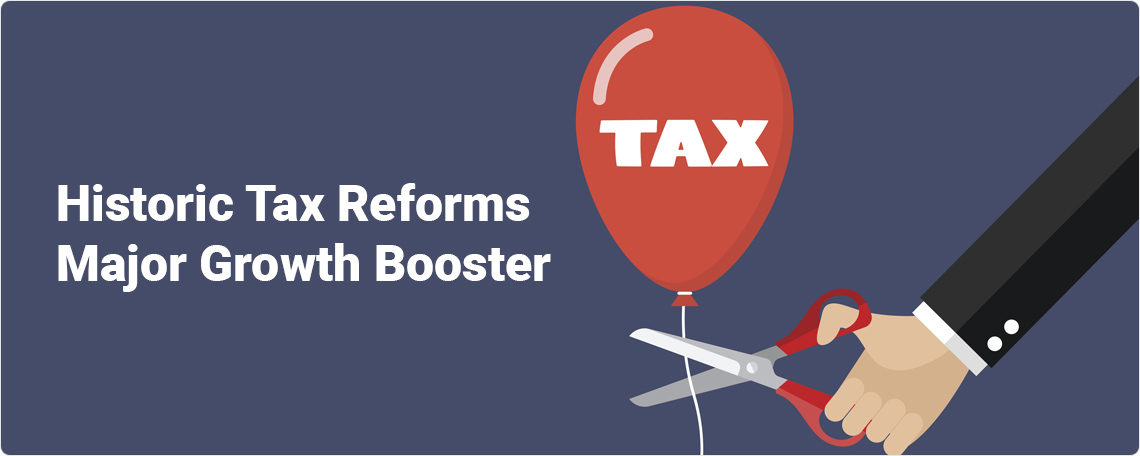On Friday, 20 September 2019, the stock markets recorded single day unprecedented gains with the BSE Sensex rose 1,921.15 points to reach 38,014.62, and the NSE Nifty rose 569.40 points to reach 11,274.20. The sole reason for this rise was tax announcements by the Finance Minister, Nirmala Sitharaman.
In an unexpected move, the Finance Minister announced a reduction in the corporate tax rate by 10% bringing it down to 25.17% (including surcharge and cess) from 34.95%. This is a much-needed booster for the Indian economy, which has been plagued by demand-side concerns. It is expected that the corporate tax cut will boost sectoral earnings by ~10% and be a particular boon for both corporate and manufacturing segments.
Background
The July 5, 2019 Union Budget had increased the surcharge for the super-rich (non-corporate) from 15% to 25% for incomes between Rs. 2 crore and 5 crore and from 15% to 37% for those with higher incomes. This decision particularly hit Foreign Portfolio Investors (FPIs) hard,which till this quarter through September 18, 2019, sold USD 4.9 billion of Indian stocks. The government has since then been taking band-aid measures like announcing reversal to the tax hike, etc., while RBI announced a 100-bps rate cute. However, none of these announcements impacted the markets till the latest one, which came as a pleasant surprise to most.
In terms of the details of the announcement, here are the key highlights:
- Corporate tax rates: With effect from FY 20, domestic companies will have to pay 22% in taxes (not including surcharge and cess).
- Minimum Alternate Tax (MAT) slashed: MAT rate has been reduced from 18.5% to 15%.
- Booster for new firms: Any manufacturing company that is set up after October 1, 2019 has the option to pay tax at 15% (plus surcharge and cess) without any additional incentives or exemptions.
- No buyback tax: For those listed companies that have announced a buyback before July 5, 2019, there will be no buyback tax payable by the corporate.
- FPIs get surcharge break: Higher surcharge announced for FPIs for capital gains on sale of securities, which includes derivatives held by FPIs, has been reversed.
- Enhanced surcharge on Capital Gains reversed: Enhanced surcharge will not be levied on capital gains which arise out of sale of equity shares, equity-oriented funds and units of business trust, which are liable to STT.
- Corporate Social Responsibility (CSR) reforms: CSR spending of 2% can now include contribution by companies for research projects in the areas of science, technology and medicine undertaken by incubators funded by the government, PSUs and public funded education entities which includes the IITs.
The corporate tax cut and allied reforms means that India is now attractive as an investment destination. The government is expected to lose Rs. 1,45,000 crore in revenue, but that number maybe smaller as the resulting boost andelasticity have yet to be factored. The loss of the government though will be a gain for corporates, whose profits will surge. FPIs trends can now reverse as India regains its sheen as an attractive investment destination. Key sectors which stand to gain from the announcements are:
-
Banking, Financial Services and Insurance (BFSI): This sector is likely to be the top gainer as most companies have a tax rate of over 25.2% with median tax rate for FY19 being 33.4%.The reduction of taxes will bolster the Capital Adequacy Ratios for banks as well as Non-Banking Financial Companies (NBFCs), in turn, reducing the need for incremental capital infusion. Banks that have a strong business model, sound balance sheets and good growth prospects are most likely to benefit.
- Companies likely to benefit: Bajaj Finance, Kotak Mahindra bank, HDFC Bank, Axis Bank, and ICICI Bank.
-
Consumption Sector: Consumption firms can benefit from the tax cut in terms of increased profitability, which can be channelled into higher investments, which, in turn, will improve the capex cycle.
- Companies likely to benefit: HUL, COLPAL, Godrej CP, Britannia, and P&G.
-
Auto Sector: The Auto industry will have a moderate benefit from the tax cuts. Certain companies in the sector would benefit more than others as among the top 40 companies in the sector with a marketcap of more than Rs. 1,000 crore, 12 companies already have average tax rates below 25.2%.
- Companies likely to benefit: Maruti Suzuki India Limited, Bajaj Auto and M&M.
-
Cement: Cement companies can be big gainers. Some companies will be able to get government tax benefits in the form of cement plant incentives that would keep their effective tax rate under 25.17%. These companies would have the choice to remain at the former subsidised tax regime or will be able to shift to the revised tax rates.
- Companies likely to benefit: Ultratech cement, ACC Limited and AmbujaCement.
-
Real Estate: The median tax rate of real estate companies is 32%, which will reduce to 25.17%. Surplus funds that the sector will generate can either be passed on to buyers to increase sales or to fund the purchase of new land. This could also be used for joint development agreements or for increasing construction-finance requirements internally instead of adding more debt. Companies may also be able to repay or pre-pay their existing debts.
- Companies likely to benefit: KNR Constructions, DilipBuildcon and Ashoka Buildcon.
The corporate tax cut has the potential to unleash animal spirits in the Indian economy and increase the competitiveness of the country as India now finds itself amongst the club of countries with lowest corporate taxrates,with taxes lower than Indonesia, Thailand, Vietnam and Malaysia. The resulting increase in profits could restore hiring, which has suffered in recent years, and bring back demand and consumption that have faltered. The move is historic and of extreme significance in terms of economic history of the country.
Follow our WhatsApp channel

